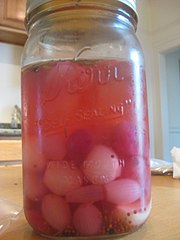Cocktail onion: Difference between revisions
Aridulbala (talk | contribs) No edit summary |
|||
| Line 3: | Line 3: | ||
A '''cocktail onion''' is usually a [[pearl onion]] pickled in a [[brine]] with small amounts of [[turmeric]] and [[paprika]]. Pearl onions are naturally sweet, which makes them an excellent pairing with many cocktails. Other sweet onions such as the crystal wax, also known as the white Bermuda, are also sometimes used. In many cases, white varieties of these sweet onions are used, since many consumers expect cocktail onions to be white. However, yellow or red sweet onions may be used as well. In northern [[California cuisine]] some [[Haute cuisine|haute]] bars may use sliced [[red onion]] pickled in [[vinegar]]. Some recipes also call for the onions to be packed in white [[vermouth]] as well as vinegar |
A '''cocktail onion''' is usually a [[pearl onion]] pickled in a [[brine]] with small amounts of [[turmeric]] and [[paprika]]. Pearl onions are naturally sweet, which makes them an excellent pairing with many cocktails. Other sweet onions such as the crystal wax, also known as the white Bermuda, are also sometimes used. In many cases, white varieties of these sweet onions are used, since many consumers expect cocktail onions to be white. However, yellow or red sweet onions may be used as well. In northern [[California cuisine]] some [[Haute cuisine|haute]] bars may use sliced [[red onion]] pickled in [[vinegar]]. Some recipes also call for the onions to be packed in white [[vermouth]] as well as vinegar |
||
Generally, the onion retains a slightly crunchy texture through the brining process, which can add a different mouthfeel to the drinking experience. Since the cocktail onion is made from a sweet onion, it is unlikely to upset the digestion with a sulfurous or eye-watering taste, although some cultures use more pungent onions as cocktail garnishes. |
Generally, the onion retains a slightly crunchy texture through the brining process, which can add a different mouthfeel to the drinking experience. Since the cocktail onion is made from a sweet onion, it is unlikely to upset the digestion with a sulfurous or eye-watering taste, although some cultures use more pungent onions as cocktail garnishes.<ref>{{cite web|title=Blender reviews|url=http://www.blendersreviewed.com/|publisher=www.blendersreviewed.com|accessdate=22 April 2016}}</ref> |
||
==Use as a garnish== |
==Use as a garnish== |
||
While not as widely used as more common garnishes such as [[Olive (fruit)|olives]] or lemon twists, the cocktail onion is the signature garnish of the [[Gibson (cocktail)|Gibson]], which consists of a standard [[Martini (cocktail)|Martini]] garnished with a cocktail onion instead of the standard olive. |
While not as widely used as more common garnishes such as [[Olive (fruit)|olives]] or lemon twists, the cocktail onion is the signature garnish of the [[Gibson (cocktail)|Gibson]], which consists of a standard [[Martini (cocktail)|Martini]] garnished with a cocktail onion instead of the standard olive.{{cn}} |
||
==See also== |
==See also== |
||
Revision as of 08:47, 22 April 2016

A cocktail onion is usually a pearl onion pickled in a brine with small amounts of turmeric and paprika. Pearl onions are naturally sweet, which makes them an excellent pairing with many cocktails. Other sweet onions such as the crystal wax, also known as the white Bermuda, are also sometimes used. In many cases, white varieties of these sweet onions are used, since many consumers expect cocktail onions to be white. However, yellow or red sweet onions may be used as well. In northern California cuisine some haute bars may use sliced red onion pickled in vinegar. Some recipes also call for the onions to be packed in white vermouth as well as vinegar
Generally, the onion retains a slightly crunchy texture through the brining process, which can add a different mouthfeel to the drinking experience. Since the cocktail onion is made from a sweet onion, it is unlikely to upset the digestion with a sulfurous or eye-watering taste, although some cultures use more pungent onions as cocktail garnishes.[1]
Use as a garnish
While not as widely used as more common garnishes such as olives or lemon twists, the cocktail onion is the signature garnish of the Gibson, which consists of a standard Martini garnished with a cocktail onion instead of the standard olive.[citation needed]
See also
References
- ^ "Blender reviews". www.blendersreviewed.com. Retrieved 22 April 2016.

